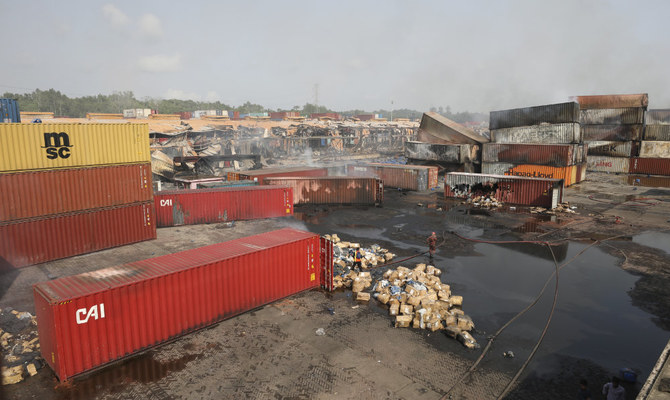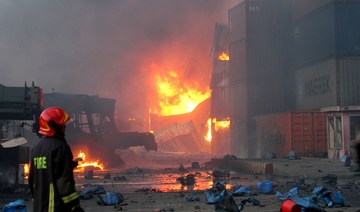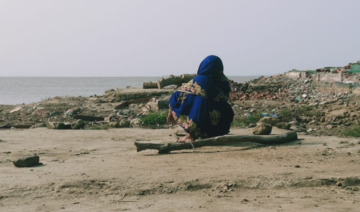DHAKA: Bangladesh authorities were still struggling on Monday to put out the devastating fire that killed dozens and injured hundreds others, as experts raised fresh concerns over industrial safety standards in the country.
Efforts to extinguish the fire at a container facility in Sitakunda, located about 40 km from the southeastern port city of Chittagong, continued into Monday afternoon after the inferno broke out on Saturday evening and triggered chemical explosions.
At least 49 people were killed and hundreds more injured in the fire, as the government launched an investigation to determine its cause.
“Although the fire has not been completely extinguished, we can say that the situation is 70 percent under control,” Mohammed Monir Hossain, assistant director of Bangladesh Fire Service and Civil Defense, told Arab News.
Hossain explained that there had been leakage from a container filled with hydrogen peroxide, which had sparked the initial fire as soon as it came into contact with air. His department is also probing the incident, and a more detailed report is expected by Wednesday.
Authorities said there were a few thousand containers at the depot spanning over 24 acres of land when the fire and subsequent explosions broke out. The death toll had included at least nine firefighters.
Syed Sultan Uddin Ahmmed, labor rights expert and former executive director of the Bangladesh Institute of Labour Studies, said the country still lacks effective measures to address the safety standards issue.
“We have not seen any effective measures put in place in previous cases of workplace accidents, and that’s why these incidents happen again and again,” Ahmmed told Arab News.
“These deaths are not caused by an accident. They happen due to complete negligence from the concerned authorities. It’s corporate murder.”
Though a lot of focus has been placed in recent years on workplace safety in Bangladesh’s prospering garment sector, other industries “shouldn’t be forgotten,” he added.
The International Labour Organization said the incident highlights the need for “an effective industrial and enterprise safety framework and enforcement and training system” to ensure a structured and all-encompassing approach to hazards.
The ILO also expressed hopes that the tragic accident “will drive all parties involved to apply renewed vigour in addressing the safety deficits in workplaces across the country,” it said in a statement.
Bangladesh has a devastating track record of industrial disasters, including factories catching fire with workers trapped inside. Monitoring groups have pointed to lax regulations and poor enforcement for those incidents.
The country witnessed its worst industrial disaster in 2013, when the Rana Plaza garment factory located outside Dhaka collapsed, killing more than 1,100 people.
Last year, a huge blaze engulfed a food and beverage factory outside Dhaka and killed at least 52 people, many of whom had been trapped inside by an illegally locked door.














